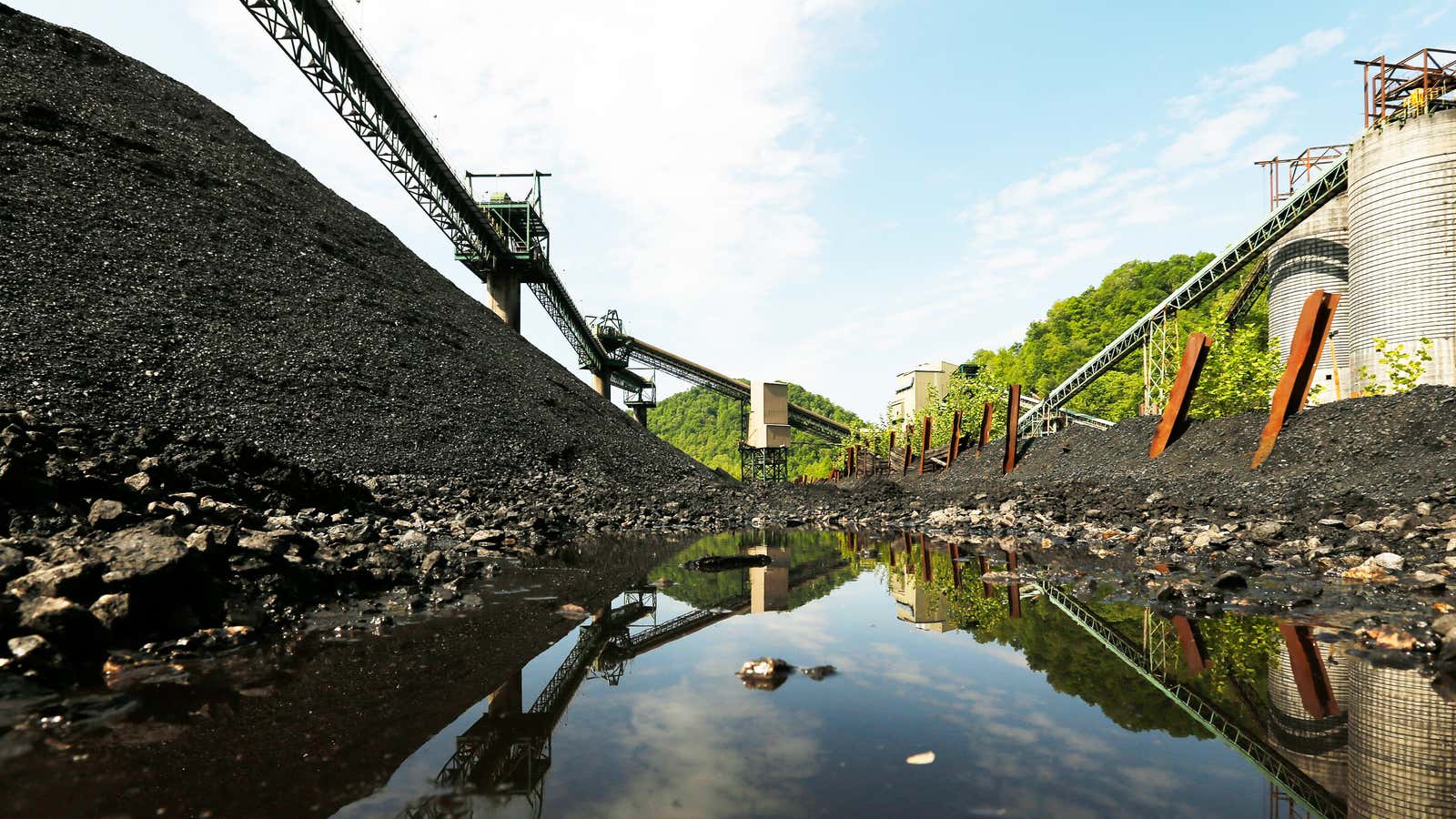As yet another coal mining firm teetered on the edge of bankruptcy, West Virginia on March 26 asked a court for control of several abandoned mines, all owned by mining firm ERP Environmental Fund. It may be the first of many emergency measures states must take to prevent hundreds of defunct mines from littering the landscape with no money to restore them.
Around the world, the Covid-19 pandemic is leading to plummeting energy demand, further destabilizing the battered coal industry. Last month, ERP, after accruing hundreds of citations from state regulators, appeared to run out of cash and fire its staff, who walked away from the mining sites. Now, the ERP mines pose an “imminent risk of harm to the environment and the public health and safety,” West Virginia contends in its lawsuit. It is asking a third party to manage ERP (the acronym stands for “Earth Restoration Project”) as it tries to recover cleanup funds from the mines’ owner.
The West Virginia Department of Environmental Protection (WVDEP) says ERP has racked up 160 environmental law violations and repeatedly ignored orders to remedy threats to public health and the environment. ERP has been operating on a “shoe-string budget with under-experienced and under-manned staff,” WVDEP contends. “The [agency] had no option but to step in to seek the appointment of a receiver to take control of ERP’s operations to protect the public health and safety.”
The legal maneuver is highly unusual, says Peter Morgan, an attorney at the Sierra Club. It means the state is trying to cut in line ahead of other creditors and keep ERP out of bankruptcy (for now). “What the state of West Virginia is desperate to avoid is all mines being abandoned and the state being responsible for cleaning them up,” said Morgan.
This is not how mining is supposed to work in the US. The federal 1977 Surface Mining Act requires all coal companies to post bonds that cover the cost of cleanup in the event of abandonment. Removing hazards, replacing soil, removing toxic waste, replanting trees, and treating waste costs millions, and leaving open coal mines is hazardous. A 2008 study in the American Journal of Public Health found higher rates of cardiopulmonary disease, hypertension, lung disease, kidney disease, and other ailments for West Virginians living near mines.
But enforcement by state agencies has been spotty, says Morgan. Their reliance on historical default rates to gauge how many companies might go under, and how much money future reclamation requires, has fallen woefully short.
State funds to cover any shortfalls, financed by coal taxes, are running dry as the market for coal goes into freefall. In 2020, renewables and natural gas have accounted for 100% of new electricity generation capacity in the US, according to federal energy data. Coal has added no new capacity. The last proposed coal plant in the US was killed off by Georgia regulators this month.
Companies like ERP were once seen as saviors for cash-strapped states. It was one of several companies buying up distressed mines around 2015. They promised to revive mining, pay off environmental liabilities, and fulfill pension obligations previous owners hoped to shed in bankruptcy court.
None of this has happened. The approximately $115 million in bonds secured by ERP aren’t enough to clean up the mess from more than 100 mining permits ERP acquired in 2016 from the defunct Patriot Coal Corporation, West Virginia says in filings. The required clean-up costs would likely bankrupt not only the issuer of ERP’s bonds, the Indemnity National Insurance Company, but leave West Virginia’s own Special Reclamation Fund empty.
The ERP fiasco is a flashing red light for other coal mining states faced with the prospect of cleaning up an industry running out of cash. In Ohio, the state’s reclamation fund has just $22.2 million to cover as much as $544.8 million in reclamation costs. Even after spending millions to close a mine, water pollution may remain a constant threat. In West Virginia, the underground Martinka mine owned by ERP requires almost $1 million annually to pump out and treat groundwater that would contaminate the drinking water of thousands of people.
At least 11 coal companies have gone out of business in the last four years. More are expected as the coronavirus pushes them “into an even more perilous position,” said Moody’s Investor Service. It predicted coal production in the US would fall more than 20% in the wake of the pandemic. And as coal slowly exits the energy equation, its legacy could blight the landscape, and public health, for generations.
ERP may be the first domino to fall. “I think it is like Lehman Brothers,” said Morgan, comparing the West Virginia mining company to the defunct New York investment bank that presaged a wave of bankruptcies during the 2008 financial crisis. “Suddenly, the holes in the system are visible.”
